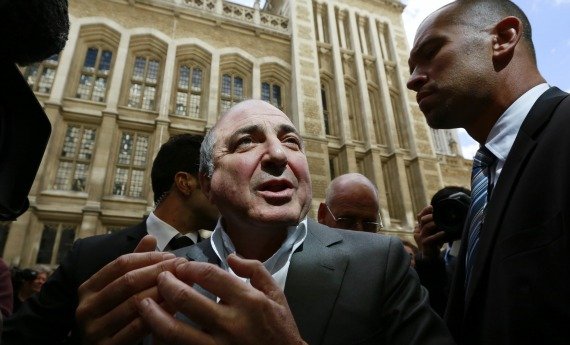
British police say there is no evidence so far that a “third party” was involved in the death of exiled Russian tycoon Boris Berezovsky in London.
Earlier today, Boris Berezovsky ‘s house in Berkshire was given the all-clear after it was searched by police for chemical, biological and nuclear material.
Thames Police said Boris Berezovsky, 67, was found by an employee dead on his bathroom floor on Saturday afternoon. The door was locked from the inside.
A Home Office post-mortem examination is to be carried out.
Boris Berezovsky emigrated to the UK in 2000 after falling out with Russia’s president, and was granted asylum in 2003.
Police are treating the death as unexplained, while scenes-of-crime officers are currently inside the property carrying out a full forensic examination of the scene.

“It would be wrong to speculate on the cause of death until the post-mortem has been carried out. We do not have any evidence at this stage to suggest third party involvement,” Detective Chief Inspector Kevin Brown of Thames Valley Police said.
“The investigation team are building a picture of the last days of Mr. Berezovsky’s life, speaking to close friends and family to gain a better understanding of his state of mind.
“We are acutely aware of the level of interest into his death and are focused on conducting a thorough investigation as we would with any unexplained death.”
Boris Berezovsky’s body was reportedly found by an employee, who called an ambulance at 15:18 GMT on Saturday.
He had not been seen since around 22.30 GMT the previous evening.
His body remained at the property while the search – described by police as a precaution – for chemical, biological, radiological and nuclear material was carried out.
The search was sparked after a paramedic’s personal electronic dosimeter (PED) – a health and safety device – was triggered.
Boris Berezovsky amassed a fortune in the 1990s after the privatization of Russia’s assets following the collapse of Soviet communism.
He survived numerous assassination attempts, including a bomb that decapitated his chauffeur.
In 2003 Boris Berezovsky was granted political asylum in Britain on the grounds that his life would be in danger in Russia.
He was married twice and had six children – two with each of his wives and two with a long-term partner.
Boris Berezovsky ‘s wealth is thought to have considerably diminished in recent years, leaving him struggling to pay debts in the wake of costly court cases.
In 2011, Boris Berezovsky reportedly lost more than £100 million in a divorce settlement. And, last year, he lost a £3 billion ($4.7 billion) damages claim against Chelsea Football Club owner Roman Abramovich.
Russian media have described Boris Berezovsky’s death as “the end of an era”.
On its website, the pro-Kremlin paper Komsomolskaya Pravda describes Boris Berezovsky as having been “clever, cunning, resourceful… a master of chaos”.
Meanwhile, Novaya Gazeta – which is normally critical of the Kremlin – described him as someone who “viewed Russia as a chess board”, albeit one on which “only he would be allowed to move the pieces”.
Former British ambassador to Russia Sir Andrew Wood, who knew Boris Berezovsky, said he had been a man of vigor who had tended to “over-egg his importance”, was at heart “not a bad man” and had been helpful to Britain in the past.
[youtube DKV7Nisqyl0]